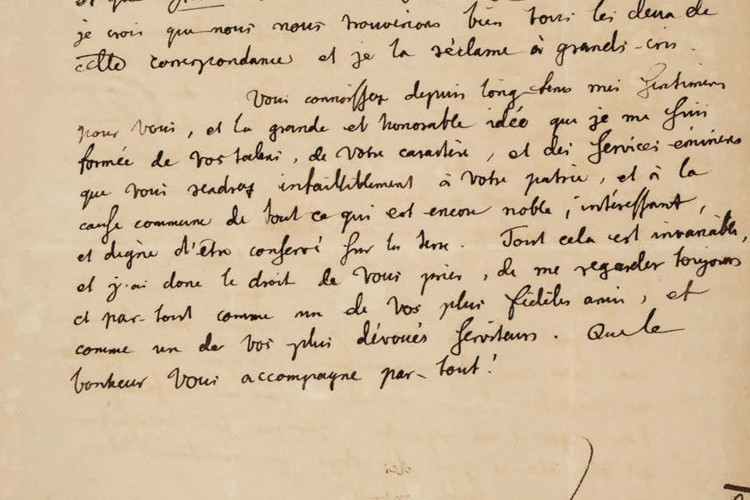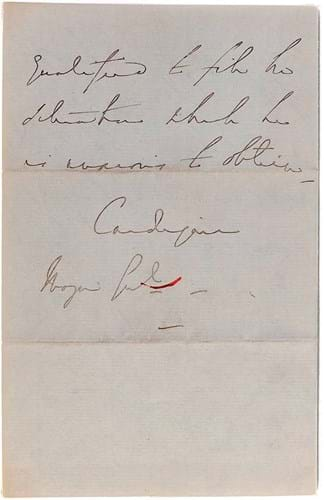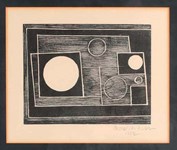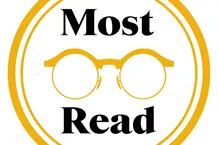The added value of diaries, journals and logbooks to militaria lots such as medal groups is well known – but letters on a wartime theme can carry great appeal on their own.
While big names in the field such as Napoleon and Wellington are guaranteed to create interest, it is not always the most obvious figures at the heart of the action that grab the attention. Politicians, diplomats and even a spymaster feature in this selection of hammer highlights.
As Hugh Bett, a specialist at book and manuscript dealership Maggs Bros of London, says: “The importance of soldiers’ letters and diaries lies in their immediacy to the action that’s being described – not just the battles, but also life in the field. Many of them remain unpublished and the good ones provide a sort of unofficial history of that campaign. It can be fascinating.”
Bett added: “Collectors come in all sorts of shape and sizes, frequently they’re descendants of those who fought, but there are others – historians and hobbyists – who want to dig a little deeper than what appears in the printed accounts.”
Private collection
A Napoleonic letters section offered at Gloucestershire auction house Dominic Winter (20% buyer’s premium) is a good example. These letters are all from the same private UK collection of Napoleonic and East India Company letters and manuscripts which the South Cerney saleroom has been selling in instalments since 2019.
The latest slice on March 10 included the Charles Stuart (1779- 1845) papers, relating to the British diplomatist par excellence of the Napoleonic era. Among these, the best-seller was an extensive archive illuminating the close personal relationship between Stuart and the Austrian political thinker and statesman Friedrich von Gentz (1764-1832). Neither are familiar names as such but played important roles in their own ways.
Stuart (later Baron Stuart de Rothesay) entered the diplomatic service in 1801, serving first in Vienna (1801-04) and then in St Petersburg (1804-08). He subsequently undertook intelligence gathering with the provincial juntas in Frenchoccupied Spain (1808-10) and made himself indispensable to Wellington as minister at Lisbon (1810-14).
He was minister at the courts of both the king of the Netherlands and the exiled Louis XVIII during the ‘Hundred Days’, in Paris from 1815-24, and in 1825 helped negotiate the treaty by which Brazil became independent from Portugal.
Von Gentz studied under Immanuel Kant in Königsberg, but soon renounced his teacher’s favourable view of the French Revolution and devoted his career to the defence of civil liberties and the equilibrium of powers in Europe against Napoleon’s imperial project. Initially in Prussian service, he relocated to Vienna in 1802, becoming propagandist and confidential adviser to Klemens von Metternich (1773-1859).
As secretary-general in the great peace congresses of the 1810s he then played a central role in the formation of the post-Napoleonic order in Europe.
The letters between the two on offer at Dominic Winter have their serious side. Gentz provided important intelligence from Berlin and elsewhere on the movements of Bonaparte and his generals (‘Vous savez que Bonaparte a quitté Paris le 30… je m’attends de grandes nouvelles’), and provided Stuart with potential informants.
However, they also reveal the human bonds often unseen beneath the transactions of high diplomacy.
Written in an elegant French and leavened with faux rebukes (‘Je vous trouve cruel de ne me rien communiquer’), they show Gentz and Stuart constantly exchanging and discussing books, pamphlets and newspapers, dining and attending soirées, and gossiping confidentially about Viennese society.
The archive sold for £4200 against an estimate of £2000-3000.
Spymaster unmasked
Another intriguing set of five letters, all but one signed, came to Stuart from spymaster Francis Drake (1764-1821), the British minister to the court of the Elector of Bavaria at Munich from 1799-1804.
They concern matters such as an intercepted letter to Napoleon and Franco-Russian relations.
To add to the intrigue, three of the bifolium letters are partly in cipher, while included in the lot was an intelligence report from Alexander Horn (1762-1820), Scottish Benedictine monk and political agent.
The Drake letters made £2400, three times the top estimate.
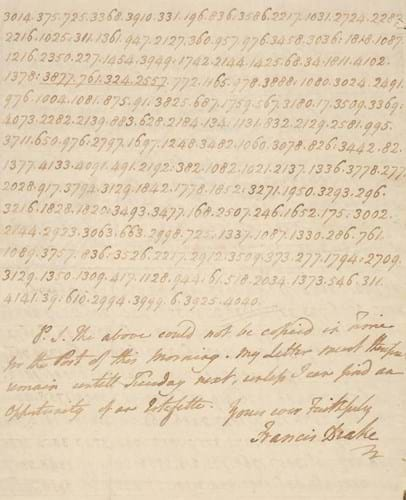
A letter from spymaster Francis Drake to Charles Stuart, partly encrypted – £2400 at Dominic Winter.
Drake was minister to the court of the Elector of Bavaria at Munich from 1799-1804, having previously served in Genoa. He was expelled after his intelligence activities were exposed by a French sting operation, described in a published account by the responsible French agent Jean-Claude-Hippolyte Méhée de la Touche (1762-1826) titled Alliance des Jacobins de France avec le Ministere anglais (1804). Drake was also lampooned in a caricature, Sir Francis Drake fuyant de Munich et retournant à Londres avec ses cartons, sa correspondance, ses encres sympathiques et ses clefs.
In 2013 bookseller Simon Beattie wrote on his blog (simonbeattie.co.uk) about a German translation of the Méhée de la Touche book he had bought (Die verrätherischen Plane Englands und der Jakobiner wider das Leben des Kaysers, und die Freyheit des franz. Volks). The German version was furnished with this “wonderful, large caricature of Drake, fleeing from Munich after the affair broke clutching books, papers, and phials of invisible ink”.
De la Touche kept tabs on French émigrés who opposed Napoleon.
Beattie wrote: “Posing as a sympathiser, Méhée inveigled himself into their circle, and was recommended to the British Foreign Office, which sent him to Francis Drake, ambassador to Bavaria and head of the British East European spy network, who provided him with codes and names of agents. In 1804, Drake was embarrassed when some letters, revealing plans of a French uprising against Napoleon, were intercepted and passed on to ministers in Paris, and duly published.”
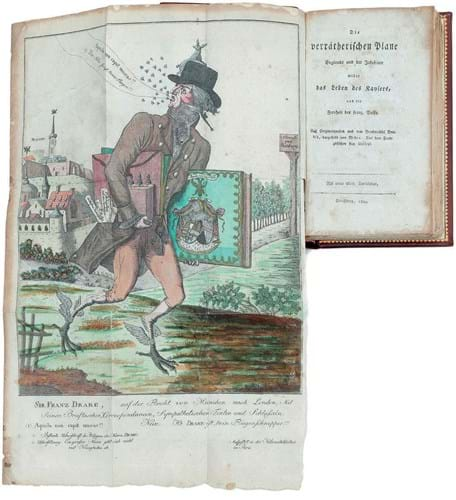
A caricature of Francis Drake fleeing Munich after having been exposed, from a German book sold by dealer Simon Beattie.
Eye on admin
Wellington did feature in this Dominic Winter collection in three lots. Sold for a double-top estimate £2400 was a group of seven Peninsular War autograph letters written to Stuart from headquarters in Cartaxo in 1810-11.
Such letters tend to support the emphasis placed by modern historians on Wellington’s extraordinary organisational and administrative capabilities as much as his command in the field. Both were key to defeating Napoleon in the Peninsular campaign.
For example, he sent a letter on February 26, 1811, commenting on a report by Sir William Erskine on the insufficient provision of bread to the Portuguese infantry.
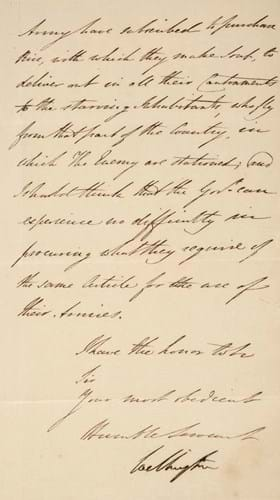
A letter from the Duke of Wellington to Charles Stuart – from a group sold for £2400 at Dominic Winter.
Diplomacy and music
Still to come from the same private UK collection (to be offered later this year) are the papers of John Fane, 11th Earl of Westmorland (1784-1859), best known as Lord Burghersh. He served with distinction under Wellington before embarking on a successful diplomatic career with a sideline as a noted amateur violinist and composer.
Cardigan letter at Maggs
After the disaster of the Charge of the Light Brigade in 1854 the blame game began.
This 1857 letter is from the man who led the charge – Cardigan (James Brudenell, 7th Earl 1797-1868) – to an unidentified correspondent and reflects that post-war arguing.
It recommends Dr [EH] Nolan, author of the History of the War with Russia, who had listened to Cardigan’s assertion that he had received “erroneous information with regard to some details of the conduct of the Cavalry”. Safeguarding the reputation of the cavalry was of paramount importance to Cardigan. Bitter accusations had flown between him and his brother-in-law Lord Lucan over the responsibility for the charge. Cardigan was later to challenge Lucan to a duel for supporting a writer who cast aspersions on his courage; the duel never took place due to a series of misunderstandings and missed encounters.
This letter is priced £675 by Maggs Bros, which notes: “Other writers on the Crimean War endured numerous letters in Cardigan’s very difficult hand. Doctor Nolan was evidently fortunate to have, eventually, earned Cardigan’s approbation.”


